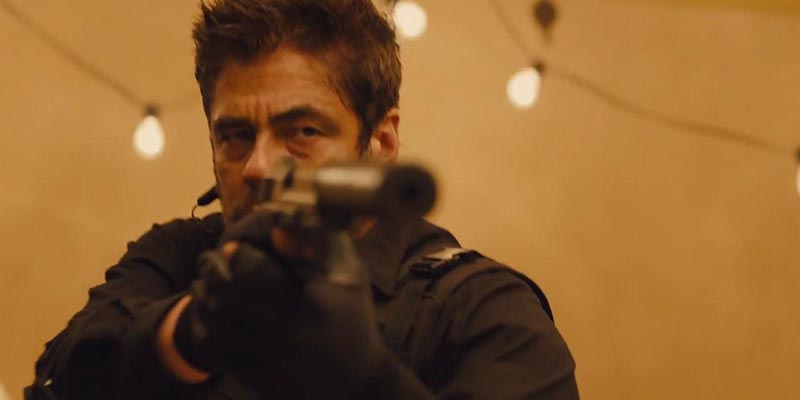Sicario Film Theory: Is Alejandro the Devil?
"Sicario" Film Theory: Is Alejandro the Devil?
Alejandro Gillick is the devil. When Alejandro calls Manual Diaz “Fausto” during the film’s climax, there couldn’t be a bigger tip-off. Fortunately I’m not the first to notice this.
Obviously, this final scene with Diaz very much illustrates the classic deal with the devil; no matter how much you benefit, you will never win in the end. Regardless of the riches you accumulate as a drug lord, and no matter how many precautions you take, the Devil will literally come knocking on your front door. You can even evade the FBI, DEA, and all of America’s top agencies, and the devil will still find you… perhaps one night while you’re eating dinner. And when he does find you, he will take everything.
Alejandro comes with all the swagger and “perfection” of a Victorian era Devil, too. He’s perfect, precise, and is able to sleep his way through mission briefings without hassle. Nobody bothers him ever- they only shake his hand, nod, and smile nervously as he floats from one side of a drug war to the other with apparent impunity. He’s recognized by everyone in the room as a man who’s just not there. At one point in the movie, while drinking water- in what is likely Alejandro’s only personal interaction in the entire movie- a local politician asks Alejandro “I didn’t know ghosts got thirsty”. It would be too much to call Alejandro a charming psychopath, but something definitely isn’t right with this guy.
It’s interesting to note that in this movie, there are at least two instances where CIA operative Matt Graver (played by Josh Brolin) declares that it’s “us or them”, and that both the present and the future of law enforcement is such that there are no rules, there are no boundaries to cross. The situation is so dire, it seems, that anything is on the board for us, the good guys. But that’s the thing he’s telling us- that there are no good guys. There are only bad guys and REALLY bad guys. And that it’s okay to be evil, if you’re the lesser evil. He stresses that this is the way it’s always been, and that the best times were when ONE evil had all the power. Heavy stuff, and it plays into a sub-theory that I’ll touch on later.
The less obvious deal with the devil is Kate’s, at the end of the film when Alejandro literally forces her to sign a document at gunpoint. This is apparently an affidavit saying their entire mission was “by the book”, when it was anything but. She refuses, but a gun is placed under her chin and she is told it she doesn’t sign the paper, her death will be made to look like a suicide.
It should also be noted that the sub-plot in the movie showing the kid who just wants to play soccer with his dirty-cop dad, is pretty powerful and important. It’s important because it takes a character that would otherwise have 5 minutes in the movie (and then dies), and shows that even that guy has a family, and his family is going to miss their dad for the rest of their lives. And this matters, because it’s not just this one guy. It’s everyone. There are
You could simply say that Kate’s “deal” is that she gave away her innocence in exchange for her life, or for “knowing”. That may be the case, as I believe that Kate represents innocence, goodness, and that which is supposedly incorruptible. Her final moral corruption however, also plays into a more interesting theory about the movie Sicario, and how it’s spiritual aspects may play even more literally; I believe there is a possibility that Kate dies in the very beginning of the film, when shen enters the room and a cartel member shoots at her with a 12 gauge. Kate returns fire and kills the guy with the shotgun (the only person she kills in the entire movie). In the film, we see the shotgun blast miss her head by inches, perhaps it didn’t. The rest of the movie is actually Kate in purgatory, and ends with her agreeing to sign Alejandro’s document. Had she allowed him to shoot her, she would have escaped and maybe even ascended to heaven, as this would have been making the ultimate sacrifice (her life) in order to preserve her integrity and goodness. Not signing the document, at the price of both your life and your dignity would have been the Christ-like option. But instead she takes the “deal”, and now gets to live on in a hellish daily existence that eats at her soul.
At the end of it all, Kate, the character symbolic of all that is just and right literally co-signs a document that uses her authority to cover up and excuse murder and, torture. There is no redemption. Good does not win in the end, only sadness and pain. Her corruption confirms that in the world of Sicario, there are no good guys; only bad guys, and less-bad guys.

